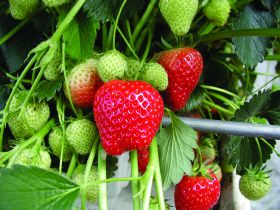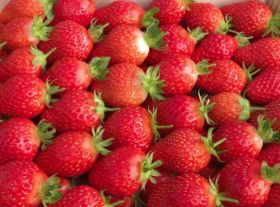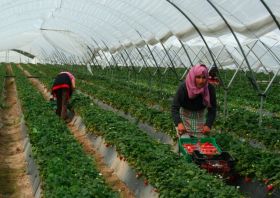Strawberries
Group has launched a new solution for powdery mildew control in strawberries
Certis Europe’s fungicide product, Karma, has been granted an ‘Extension of Authorisation for Minor Use’ (EAMU) to allow applications to be made on protected and outdoor strawberries.

Karma (potassium hydrogen carbonate), a fully registered plant protection product, is specifically formulated to deliver a low residue risk, short harvest interval, low environmental impact and good curative disease control activity, used as part of an effective IPM anti-resistance strategy and leaving no deposits on fruit.
Dennis Wilson, an independent consultant, outlined the importance of the product for the soft fruit industry.
“Strawberries are the most important home-grown fruit crop, representing almost 50% of the value of all UK-grown fruit output,” he said. “However, most of the currently favoured strawberry cultivators are highly susceptible to powdery mildew.
“Strawberry growers currently have access to several active ingredients to control such disease outbreaks,” Wilson added. “However, the long strawberry harvest season and the imminent, potential loss of some staple actives pose a concern to powdery mildew control going forward.”
The label states that for use of Karma on outdoor and protected strawberries, the maximum individual dose is 3kg/ha. Growers can make a maximum of eight applications per crop per year providing the maximum total dose of 24kg/ha/crop isn’t exceeded.
First British strawberries are available a week earlier than usual, with growers on the outskirts of Cardiff one step ahead of the rest

As a result of a generally mild winter; growers have produced the first British strawberries – a week earlier than usual.
These berries, on their way to retailers such as Tesco across the UK, also mark the first time ever that Wales has successfully produced the UK’s earliest strawberries, ahead of the likes of Kent, Sussex and Hampshire.
The variety of these early season Welsh-grown strawberries, grown in the Rhymney Valley, near Cardiff, is called ‘Driscoll’s Lusa’ and have been selected because of their consistent, sweet taste.
Freshuelva urging producers to destroy fruit rather than sell it at below-cost prices
Spanish strawberry producers are facing another disastrous season, with many being forced to discard fruit and dismantle farms two months before the end of the season due to plummeting prices, according to Huelvan grower-exporter association Freshuelva.

The organisation’s president, Alberto Garrocho, told F&H Hoy that the season so far had been worse than last year which was itself one of the worst in recent years. “Two weeks ago, prices were down 20% on 2013, but now it is closer to 40% ,” he said.
With prices barely reaching €0.30 per kg – well below the cost of production – Freshuelva is advising growers to take the necessary course of action to ensure that losses are kept to a minimum. However, Garrocho claimed businesses had a responsibility to destroy fruit rather than marketing it at below-cost prices, which would have negative repercussions for the entire industry.
Garrocho claimed that the collapse in prices had led to a “significantly high volume” of fruit being thrown away and many producers opting to take down farms in order to save on the cost of labour and harvesting.
Growers in the province of Huelva, where around 96% of Spain’s strawberry production is concentrated, were banking on a positive 2014 campaign to make up for the poor returns they received last year. In 2013 the sector saw a 10 per cent fall in output and 20% drop in prices compare with the previous year, ending the campaign with a production total of 274,800 tonnes and sales of €315m. In spite of the poor season, Huelva’s strawberry acreage increased by 2% this year to 6,980ha.
Garrocho pointed out that although a small proportion of discarded fruit is being used for processing, the factories are unable to deal with the high volume currently available and the bulk is therefore going to waste.